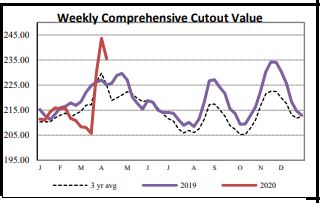Ending Price Gouging Sen. Rounds says is Matter of National Food Security

In the midst of the COVID-19 crisis, consumers’ rush to stock up on groceries, cleaning some stores out of meat completely, during the week of April 3rd, packers cut the price they were willing to pay cattle producers. At livestock auctions farmers and ranchers were paid less than $1.11 a pound for finished cattle. At the same time, packers increased the price of boxed beef sold to grocery stores approximately 20 percent compared to the beginning of March. For more data, click here.
Price gouging has concerned South Dakota farmers and ranchers for years. However, it was tough to prove the need for governmental oversight.
That is until COVID-19.
“The farm-gate marketing system is broken, and it is no more obvious than today because COVID-19 has shown us that there is price gouging going on. There has always been price gouging, but the COVID-19 has made it even more obvious,” explains Doug Sombke, S.D. Farmers Union President and Conde farmer. “This is not only a farmer/rancher issue, this is a consumer issue.”

Sombke explains that as consumers’ rush to stock up on groceries, cleaning some stores out of meat completely, during the week of April 3rd, packers cut the price they were willing to pay cattle producers. At livestock auctions farmers and ranchers were paid less than $1.11 a pound for finished cattle. At the same time, packers increased the price of boxed beef sold to grocery stores approximately 20 percent compared to the beginning of March.
The packers’ actions caught the attention of South Dakota Senator, Mike Rounds. Already alert to the possibility of market manipulation, in summer 2019, Rounds asked the U.S. Department of Agriculture (USDA) to investigate beef packers.
The recent market fall prompted him to take further actions.
Frustrated by the fact that the USDA investigation was still under review, on March 19 Rounds drafted a letter to the Department of Justice urging the Attorney General to investigate allegations of price gouging in the beef packing industry.
“This needs to stop. Currently, the market is not working,” Rounds says. He explains 80 percent of beef markets are controlled by only four packers. He adds that price gouging at any time is wrong, but during the COVID-19 crisis it impacts all Americans – cattle producers as well as consumers. “Consumers were paying higher prices in grocery store for beef while at the same time farmers and ranchers are getting extremely low prices for livestock.”
Like Sombke, Rounds sees price gouging as a food security issue. “It is absolutely critical that our producers be able to receive a fair wage a fair payment for the product that they produce. And they cannot be subject to market manipulation,” Rounds says. “If they are, we will lose our domestic food supply and we will be totally dependent on foreign food sources. That is not good for the consumers in this country and most certainly it is a bad and very sad day for our American producers who are as efficient and as good at producing not only high quality food, but large quantities of food as well.”
He points to the current situation in pharmaceutical industry as a reason to protect our local food system. “Now that a lot of pharmaceutical production is in China, we see how important it is, during crisis to control the distribution of pharmaceuticals. We could have the same problems if we lose our domestic food chains,” Rounds explains.
To help protect cattle producers impacted by COVID-19 Rounds joined with 147 other Congressional leaders in asking U.S. Secretary of Agriculture, Sonny Perdue to incorporate payments to livestock producers into Phase 3 of the COVID-19 CARES Act. Similar to current Market Facilitation Payments (MFP) made to crop producers. “We got an additional $9.5 billion for producer losses, including livestock producers,” Rounds explains. “This is one more tool to help producers during a really tough time.”
April 6, Rounds was among a group of Senators who wrote to U.S. Secretary of Agriculture asking the USDA to take additional emergency measures: “such as deadline extensions, loan payment deferrals, payment forbearance, and a full suspension of all current and pending foreclosure actions effective for the duration of the pandemic and subsequent economic recovery. The Department should also consider taking additional emergency actions – including the authorization of loan restructuring and loan balance write-downs – that were not included in the March 26 announcement. Such measures are critical to avoiding disruption in the country’s food supply chain.”
Now is the Time for MCOOL

Long before COVID-19, U.S. cattle producers saw their profits disappear. In fact, since 2015, many experienced a 60 percent reduction in the price they received. Why? Because in 2015 when Country of Origin Labeling (COOL) was repealed, U.S. cattle producers lost their ability to compete. “Even though we raise the highest quality beef in the world. Without truth in labeling, the consumer does not know where the meat they buy comes from,” Sombke explains.
In fact, without labeling regulations, meat processors began applying “Product of the U.S.A.” labels to meat packaged in the U.S., whether the steak came from a cow raised in the U.S., Canada, Mexico, Brazil or Australia – or the burger was a blended mix of meat from all five countries.
Rounds has worked to put a stop to false labeling. In October 2019, he introduced the Beef Integrity Act, which would limit labeling meat as Product of the U.S.A. livestock born, raised and processed in the U.S.
March 19 he urged President Trump to support the State of South Dakota Legislative resolution to revisit U.S. Mexico Canada Agreement negotiations and reinstate mandatory COOL (mCOOL). “Beef packers can process beef here that comes from other countries and tell the consumer that it is product of the U.S.A. This is wrong,” Rounds says.
“We appreciate all Senator Rounds’ efforts to protect South Dakota’s number one industry as well as the livelihoods of the thousands of families who raise cattle and crops,” Sombke says. “Farmers Union has worked non-stop to have mandatory COOL reinstated. We kept hitting roadblocks. We kept wondering, ‘how bad do things have to get before others recognize the need for truth in labeling?’”

